You know, up until a few weeks ago, I would have said that I was a fan of all kinds of "genre" media, except for westerns. Like how some people say they like any music except country. That was me with genre fiction. Only, as it turns out, just like that time that I realized how much I enjoy The Band Perry, I quite like westerns. I just don't like westerns about men.
Yup, it seems that feminist westerns are actually totally up my alley. I just never figured this out before because of how incredibly rare they are. So while I still have little to no interest in John Wayne and his imitators, give me a lady on a horse with a shotgun trying to defend her homestead, and I am completely there.
Now, when I say that no one told you about it, I'm probably being overly harsh. The film has been mentioned in passing by a few magazines and probably someone you know heard about it at one point. But for all intents and purposes, this is a movie that was wiped clean off the face of the earth. The first time I heard of it was when I found out it was showing, and I entered the theater only to find about four other people in there, all as confused as I was that a movie reuniting Natalie Portman and Ewan McGregor for the first time since Star Wars was getting this little press.
The movie, which was actually produced by Portman as a kind of passion project, is about a woman living way out west in the late 1800s - the titular Jane - who is forced to defend her husband (Noah Emmerich) and her home from a band of outlaws looking to kill them all. To do this she gets help from an ex-boyfriend (Joel Edgerton) and together they stand down the vicious assault.
There is, frankly, not much more to the story than this. The film opens on Jane (Portman) telling a story to her young daughter. A bit later, after a bunch of establishing scenes that display the hardship of life on the frontier, her husband (Emmerich) staggers in, suffering from several gunshot wounds, one of which has hit his spine and rendered him incapable of walking properly. Jane treats him, then takes their daughter and rides off to a neighbor. She leaves the girl there.
All of this is done with almost no dialogue. In fact the first big talking scene of the movie comes when Jane approaches Dan (Edgerton) and asks for his help. She even offers to pay him. But he's not interested in helping her. So she goes to town and buys a bunch of guns and bullets.
It's in town that we finally get an idea of why Jane is so scared - bear in mind that none of this happens with any explanation whatsoever. The movie just plunks you down in the middle of the situation and assumes you'll keep up. When Jane is pulled behind a building and assaulted, we come to find out that she and her husband are wanted by a gang of outlaws. The gang tracked down her husband, shot him, then lost him again. They're willing to let Jane go if she'll just turn on her man. But she won't.
Dan happens in at just that moment and saves Jane, finally agreeing to come back and help her defend her home. The rest of the film is basically Jane and Dan relearning how to be around each other while Jane's husband slowly dies in the next room and a literal mustache-twirling villain (Ewan McGregor) hunts them down. Jane and Dan set traps upon traps, weaponizing the home and making a desperate bid to save their own lives, but the real meat of the story is in the slow reveal of what happened between them all those years ago. Like the best romances-gone-wrong, each of them has a different take on it, and each of them has a legitimate reason to believe that they are the one worse done-by.
I won't go into the details, but suffice to say that the slow cessation of hostilities and the eventual reconciliation between the two is heartbreaking and wonderful all at once. The film has put a lot of effort into making sure that there really is no wrong side here. Jane's husband isn't a horrible man who stole her from the righteous Dan, but Dan's not some philandering jerk who gave Jane reason to leave him.
And Jane, for her part, is not condemned or even wrong in her actions. Life just happened to these three people, leaving them all a bit broken and sad but capable of coming back together. Perhaps the most touching moment in the whole film is when Jane's husband and Dan finally come to an understanding together and realize that the hatred they've harbored all these years is useless.
This should not, however, give the impression that this is some kind of tearjerker "chick flick"* all about feelings. Oh no. The feelings are devastating when they come, but most of the film is almost entirely without dialogue, a mood piece that puts you squarely into a time and place where people didn't seem to have much use for talking.
To say that the film is sparse is to do it a disservice. I mean, it is, don't get me wrong, but sparseness is not so much a flaw as a feature. The lack of banter or overpowering music or even extravagant set decoration imbues everything, every word or bar of soundtrack or jar on the table, with meaning and emphasis. It's really well done.
Still, I think the reason I ultimately like this film, and the reason it's achieved the dubious honor of being included in Strong Female Character Fridays, is because it centers on Jane. If this were a movie about Dan, I wouldn't like it so much. It would be just one more western about a loner coming in to save a woman and her child and being repaid by a reintegration into society. It would be reinforcing the narrative that women are in westerns to be looked after, as macguffins that create the plot but cannot contribute to it.
Without Jane being the central figure here, the one whose actions actually matter and are established as the most important, this movie goes utterly flat. It has all the hallmarks of being the kind of movie I hate, actually. I mean (minor spoilers), this is a story about a women who escaped a sex trafficking ring and settled in with the man who helped her escape being tracked down and hunted by her abuser. She goes to the only man she knows who can help, her ex-military ex-boyfriend, and he saves her and her daughter with his massive bulging muscles and lone cowboy ways.
Tell me you aren't sick of that movie.
From the usual perspectives, this movie is garbage. It's not new or interesting or even palatable. But because this film is about Jane, because it's from her perspective, suddenly it's a movie we've never even considered before.
So obviously the movie has that going for it. For all that westerns frequently mention or tangentially engage with the various arenas of sex work - you know, saloon girls, brothels, side-of-the-road whores - they almost never actually make these women into compelling characters you can really know. Jane is a former prostitute, yes, but she's also a person with feelings and aspirations and dreams and regrets. She's fully human here, and she's wielding one hell of a shotgun at anyone who tries to deny that.
To make matters even better, Jane isn't just some cardboard cutout of a "strong female character" either. She's not John Wayne in a dress. While she is a good shot with a rifle, a fact that the movie points out as being just common sense when you have to hunt for your dinner more often than not, Jane knows very little about strategy or defending a position. That's why she needs Dan - her acknowledgment that she needs him isn't a weakness or insult to her strength, it's a sign that she's mature enough to understand her own limitations.
And while Jane is very soft-spoken and stoic, she's not falling into the "I have no feelings because I'm strong" category. She has feelings, she just doesn't let them out very often because they hurt too much and there's not much point wallowing in the past. Jane is basically everything we could have thought to ask for in a feminist hero for the modern western - complete with the badass ending.
She even gets a prolonged swagger-tastic ending sequence that proves she was the hero of this film all along. In your average western it would be Dan who (big spoilers) gets to turn in the bodies of dead outlaws and collect their reward money before climbing onto a wagon with his fawning wife and children. But here those roles are reversed. Jane gets the swagger into town and Dan waits with the kids and their stuff. It's glorious.
I think it's kind of funny, when you get down to it, how little had to be done to this film to make it brilliant. I mean, it's just the movie we've been making for a hundred years turned ninety degrees - there's no massive structural shifts or gigantic innovations in narrative. The cinematography is beautiful but familiar. The score is good, but not surprising in any way. Literally the only difference between this movie and a dozen classic westerns is the gender of the main character, but somehow that's enough.
And it also says something about our culture, though something far less complimentary, that this movie was so summarily dismissed. Its own studio saw it as an embarrassing fluke to be quietly dumped, but here it is, one of the most interesting films so far this year. It says a lot that they don't think we'd like this so they didn't even bother telling us it existed. It says a lot, but none of it good.
Because I want more movies like Jane Got a Gun and I want more heroes like Jane. I want ladies who sling guns; I want characters who define themselves on their own terms.
I want stories where the ladies are given control of their own narratives, where a character can be a rape survivor, can have lost a child, can be mourning her husband before he's even gone, and can still be the kind of badass that sets fire to her own house because she knows it has to be done. I want women who are not defined by their trauma but do not deny it either. And I want more movies with women wearing cowboy hats and riding across the plains.
I should point out, though, that this is not a flawless film. It's very white, which seems completely normal for a western but is actually grossly unrepresentative of the actual west, and the plot, though fantastic, does sometimes stall into tedium every once in a while. But it's still better than ninety percent of the movies out there, so take it all into consideration.
I think at this point we can say comfortably that I am on board with westerns. I wasn't up until now, but I hereby embrace all forms of genre fiction, westerns included. Just don't try to sell me on any of that John Wayne crap. As in all my other interests, I'm here for the ladies.
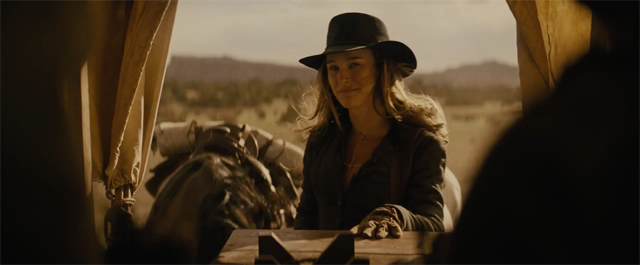 |
| Yes please. |


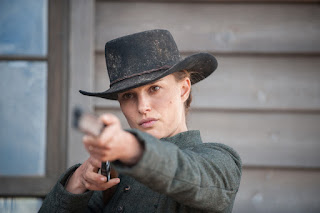

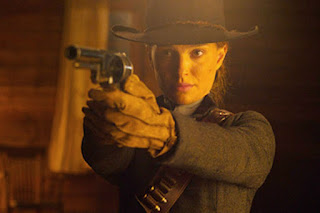
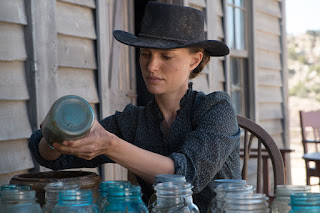
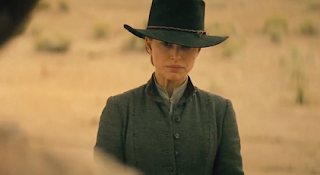
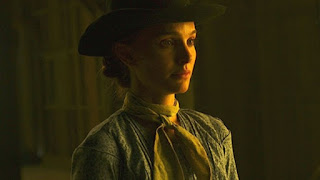
I had seen an ad or two for the movie, but your review has definitely gotten me interested.
ReplyDeleteHave you seen the remake of True Grit from 2010, and if so what did you think? Unlike the John Wayne version, the directors made sure the central character was the young girl (the new movie was based more closely on the book).
I actually have not seen True Grit (either version), but I am totally willing to check it out! I remember when it came out I saw Haillee Steinfeld in it, but I passed it by because I assumed that I don't care about Westerns. Must reevaluate!
DeleteAnd really that's kind of silly when you think about it. I mean literally nothing in this movie is different from your standard western aside from the POV, but that one teensy change completely upends the film.
ReplyDeleteHow many times now have we observed that the changes needed to make a film feminist are often very small?
Movie critics alike didn't seem to know what to do with a movie that focuses on the abused woman herself, a hero who doesn't think of herself as being "damaged goods" or even particularly physically strong, just a person with a will to survive.
Is it just me, or have there been a lot of shows and films like this lately? Is it too much to hope for a tide to be turning in this area?
So many times. I find it actually quite frustrating how easy it would be to make all these movies better and more feminist. Like, it's so easy! Just fix it!
DeleteI deeply hope that the tide really is turning, but I have no idea how to actually measure it. I think it is? I want to believe it is. But I know that I in particular am easily victim to confirmation bias.
ESCORT
ReplyDeleteESCORTS
FEMALE ESCORTS SERVICE KOLKATA
KOLKATA FEMALE ESCORTS SERVICE
INDEPENDENT ESCORTS SERVICE
INDEPENDENT ESCOTRTS SERVIC KOLKATA
KOLKATA INDEPENDET ESCORTS SERVICE
RUSSIAN ESCORTS SERVICE KOLKATA
RUSSIAN ESCORTS SERVICE
KOLKATA RUSSIAN ESCORTS SERVICE
FOREIGN ESCORTS SERVICE IN KOLKATA
INDEPENDEN FOREIGN ESCORTS SERVICE
ESCORT FOREIGN SERVICE IN KOLKATA
SEXY FEMALE ESCORTS SERVICE
SEXY MODEL ESCORTS SERVICE
MODEL ESCORTS CALL GIRLS
MODEL ESCORTS CALL GIRLS SERVICE KOLKATA
CALL GIRLS SERVICE KOLKATA
CALL GIRLS IN KOLKATA
KOLKATA CALL GIRLS
KOLKATA CALL GIRLS
Nice to read this blog and Thanks for sharing it!!
ReplyDeleteladies handbags in pakistan
Hi!!
ReplyDeleteThis is really informative and wonderfull blog
Thanks for visit the blog and share this blog
For all information visit the blog
Custom Packaging Boxes Uk
We often place our handbag on the kitchen counter, a bench, and some even momentarily meet the floor so for hygiene reasons alone, it is not acceptable. More Details
ReplyDelete